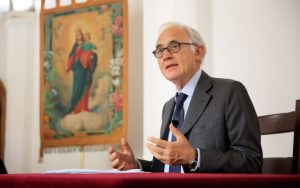Without calm no victory is possible
Fra' Francesco | Posted on |

If the current pandemic has caused more than two million deaths, its most serious consequences seem to be, beyond this number, the acute forms of psychological suffering which affect dozens of millions of people.
The World Health Organization itself has affirmed that mental health concerns are the top priority in this phase of the pandemic. The situation of instability and psychological imbalance arises not only from the difficulty for modern man to adapt to an unforeseen event, such as the threat of an invisible virus, but also from his difficulty in dealing with the exaggeration of the media with confusing information which troubles our brain. Information often distressing, contradictory, difficult to evaluate, especially when a scale of reference values is missing. This information relates not only to health, but more generally to the future of society. The virus has revealed the fragility of modern man, victim of his relativism, vulnerable in his feelings, unable to master emergency situations: today a pandemic, tomorrow a serious economic crisis or a war.
Such situations require calm and poise, precisely what is lacking in the man of our time, restless, inconstant, indecisive. Quite the opposite, calm is a disposition of the soul, made up of tranquility and reflection, which prompts us to firmly face any hostile situation.
Calmness puts in order the primary faculties of the soul which are intelligence and will. Keeping control of yourself, never losing your temper: there was a time when it was a matter of good Western and Christian education. Prince Bernhard von Bülow, Chancellor of Kaiser Wilhelm II, remembers being, as a child, a nervous little boy in whom his parents instilled the maxim “keep your nerve”, which was later a foundation of its policy. Today, good education has also been lost.
Modern man easily loses his calm, gives in to his passions, loses his temper, verbally and sometimes even physically attacks his neighbour, becomes agitated and despairing when he suffers failure.
Even good Catholics sometimes lose the inner calm, the balance of the powers of the soul, patience, which is part of the virtue of strength. There is a natural calm, which arises from the habit of controlling one’s feelings and passions, and a supernatural calm, which arises when intelligence and will rest in God who is infinite stillness, the still motor of the universe.
In God, there are no internal upheavals, emotions, or troubles. God is always equal to himself. Passions and feelings belong to human nature and are not sins but can be ordered by the higher faculties of the soul. The Blessed Virgin underwent strong emotions in her life: she was troubled at the word of the Angel, she cried on Calvary, she felt a holy hatred of sin, but never lost her calm. . Her heart has always been immersed in divine peace. In her everything is always perfectly ordered. Saint Joseph, despite the setbacks, faced with calm and serenity moments of immense difficulty such as the trip to Bethlehem and the flight to Egypt.
Jesus Christ is the model of perfect and unwavering calm. The Shroud is a face which, in supreme pain, expresses sublime calm, absolute seriousness, infinite love for God and for men.
Jesus intervenes in our life to calm all the storms that might blow us away. After the storm, calm settles on the lake of Gennesaret after Jesus scolds the wind and says to the sea: “Silence! Be quiet!”. The witnesses of this scene, filled with fear, ask themselves: “Who is he, then, that even the wind and the sea obey him?” “It is He, it is Jesus, the prince of peace who came to bring peace to troubled and helpless souls, in search of hope and comfort.
In any situation, calm must overcome agitation. Nothing, not even sin, should make us lose confidence and calm. Calm is the necessary recollection for the soul to open up to divine Grace. And Grace is the only good to which we must aspire. Grace requires calm, inner life requires calm, and so does struggle, for without calm no victory is possible.
In the face of the mystery of evil or of pain, the soul, instead of surrendering itself to the will of the Lord, can sometimes give in to the temptations of resentment, anger or revolt. This is why we must ask the Lord to never allow ourselves to succumb to temptation, according to the formulation of the Our Father in its correct theological sense, and never to allow us to lose the balance and the tranquility of the soul.
So let us abandon ourselves to God by saying to him: “May Your Will be done.
Robert de Mattei
February 1 2021
